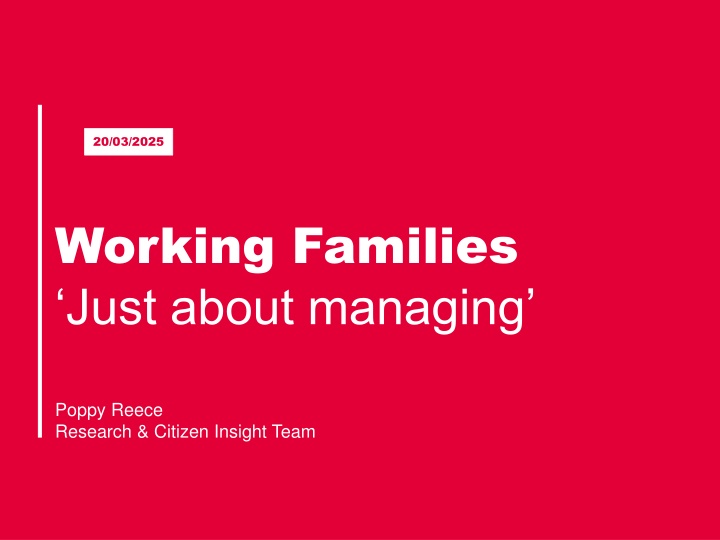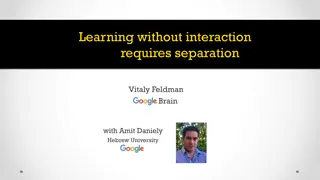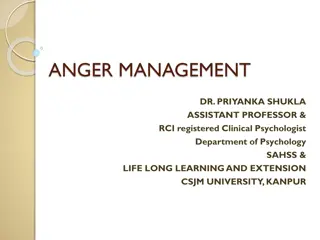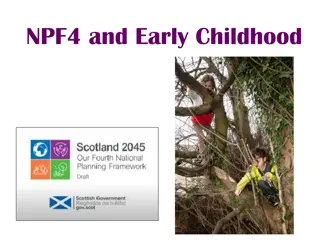
Working Families Just About Managing in Essex County
Learn about the Working Families Just About Managing (JAM) programme in Essex County, focusing on families earning below a decent standard of living but not in severe deprivation. Discover key research findings and strategies to support these families.
Download Presentation

Please find below an Image/Link to download the presentation.
The content on the website is provided AS IS for your information and personal use only. It may not be sold, licensed, or shared on other websites without obtaining consent from the author. If you encounter any issues during the download, it is possible that the publisher has removed the file from their server.
You are allowed to download the files provided on this website for personal or commercial use, subject to the condition that they are used lawfully. All files are the property of their respective owners.
The content on the website is provided AS IS for your information and personal use only. It may not be sold, licensed, or shared on other websites without obtaining consent from the author.
E N D
Presentation Transcript
20/03/2025 Working Families Just about managing Poppy Reece Research & Citizen Insight Team
20/03/2025 Background - Working Families Just about Managing Programme pre-COVID 19 Essex County Council (ECC) is committed to taking a cross-cutting, organisational approach to tackling the issues of deprivation, disadvantage, inequality and social mobility in the county. In developing its approach to these areas, it became clear that both problems and solutions are relevant to large parts of the population of the county, in addition to the smaller cohorts of those traditionally regarded as high-needs individuals. Within this cohort, a significant number may be considered just about managing (JAM) earning below the level required for a decent standard of living, but not so far below that they are experiencing severe deprivation. MINIMUM INCOME STANDARD: The income needed in order to reach a minimum socially acceptable standard of living in the United Kingdom today, based on what members of the public think. Before COVID-19 we were using the Minimum Income Standard (MIS) to define JAM families in Essex, as a target group for this programme. Before COVID-19 we estimated: Up to 27% of children in Essex live in JAM families. Up to 24% of working age parents in Essex live in JAM families. Adapted from Research by Joseph Rowntree Foundation and the Centre for Research in Social Policy, Loughborough University.
20/03/2025 Background - Working Families Just about Managing Programme pre-COVID 19 Last year, we commissioned research organisation Britain Thinks to conduct research with those who are just about managing , focusing on working-aged families with children (including single and dual parent families), in order to understand their lived experiences, and in particular the impact on children. The research was conducted across two phases: The research sample contained a diverse mix of participants: ECC s Research & Citizen Insight and Public Health teams also carried out a deep-dive into the quantitative data available locally and nationally, as well as research with our own employees who may be JAM.
20/03/2025 Key research findings JAM families are not homogenous, but can be grouped according to three broad typologies: 1 There are a number of factors that can indicate where families sit on this scale:
20/03/2025 Key research findings Ensuring that children have a fulfilling and enjoyable upbringing is the priority for JAM families They work hard to isolate their children from the worst effects of their financial situation Income level is not the primary frame through which they define themselves. Instead, they see themselves as ordinary, working families 2 All JAM families are in an uncertain financial situation month-to-month, with limited resilience for dealing with the unexpected Differences in stability of the 3 groups are shaped by factors including debt and income regularity Managing money on an insufficient income requires JAM families to be savvy . This takes considerable time and mental energy, leaving limited mental bandwidth for thinking about much else 3 Ability to plan for the future relies on feeling stable and in control in the present Plans are often tangible and actionable, with three common goals being: achieving financial stability, increasing family time, and ensuring housing continues to meet their family s needs 4 Social mobility is desirable only in as far as it would make it easier to get by It wasn t really considered as a specific goal for any participants It doesn t seem achievable to those struggling to make ends meet each month The factors that appear to facilitate/drive social mobility are: 5
20/03/2025 JAM families and coronavirus The initial research concluded shortly before the coronavirus epidemic took hold in the UK. During this period of nationwide uncertainty and upheaval, we felt the need for further research to understand the impact of lockdown and coronavirus on JAM families, with a focus on their: Responses to self-isolation and/or social distancing Management of additional childcare responsibilities following school closures Experiences of work, including working from home Anxieties and concern related to income and job security Attitudes to health and wellbeing Impact of coronavirus on longstanding issues and stresses Britain Thinks carried out this research with the same 14 families who took part in the original research, taking a longitudinal qualitative approach, to observe changes over time.
20/03/2025 JAM families and coronavirus key findings: FINANCES The financial impact is uneven, with three new groups emerging in terms of financial stability: Families across the different typologies previously identified have ALL been vulnerable to the shock resulting from coronavirus. The financial impact has been polarising - some that were previously more stable have fallen through cracks for income support, while others that were previously struggling are finding they have more money. All have seen outgoings decrease but this is not enough to compensate those with decreased income. Those worst affected are relying on short-term solutions, but they are running out of options and are at risk of increasing personal debt and being unable to cover the essentials. Options that involve taking on debt are seen as a last resort . Some have turned to Universal Credit. All are being more cautious with their money, while those in the most vulnerable position are cutting back considerably (including on food shopping and meals).
20/03/2025 JAM families and coronavirus key findings: EDUCATION The priority for parents has been to minimise the emotional stress for their children, and keep them safe. Education has not been a high priority at this time. Most parents describe a relatively hands off approach to home-schooling, though this does vary. Even the most enthusiastic teacher-parents struggled to maintain their/their children s motivation long-term. There is significant variation in communication/activity from schools, and in general parents wanted more contact and help from their children s schools. Those felt to be at a disadvantage included: children due to sit GCSEs and A-levels, and children with special educational needs. Parent s views on their children returning to school were mixed suggesting that differences in parents approach will likely endure beyond lockdown. As some parents feel there is nothing they can do, while others may continue home-schooling over the summer, significant attainment gaps may emerge between children within this cohort.
20/03/2025 JAM families and coronavirus key findings: HEALTH AND WELLBEING Emotional health and wellbeing At the start of lockdown, fear of infection from coronavirus was parent s main health concern. However, as time went on, this fear subsided and other concerns became higher priority most of which were related to mental health. Lack of social contact was seen as the hardest aspect of lockdown, with concern that this period may have long-term impacts on their children s social skills (particularly younger children). There are also some indications this has been harder for boys, who may feel less able to reach out to their friends. Over time, parents said they noticed changes in their children indicative of worsening mental and emotional wellbeing - e.g. younger children acting up /being clingy or insular, and older children being de-motivated to do anything and spending prolonged periods in their room alone.
20/03/2025 JAM families and coronavirus key findings: HEALTH AND WELLBEING Physical activity and healthy eating Previous research indicated that physical activity tended not to be a priority for this group and that the main source of physical activity for children was through school and after-school clubs. During lockdown, physical health was less of a concern for families, despite most (8/14 participants) seeing a decline in physical activity during this time some more significant than others. Parents have taken differing approaches to health and well-being some have daily routines incorporating exercise plans, while for others, exercise is more sporadic. As with home-schooling, adherence to routines tended to decline over time as motivation decreased. Many said they generally felt less healthy, with a few commenting that they have been drinking more than usual. Three participants also spontaneously reported weight gain.
20/03/2025 JAM families and coronavirus key findings: LOOKING AHEAD Whereas previous research highlighted stark differences in the extent to which JAM families felt able to plan for the future, ALL are now focused on the short-term and getting through the next few months. Even those whose circumstances have remained stable are unsure of what may change in future. Priorities in the next few months include keeping children occupied (particularly through the summer holidays) and keeping or finding stable work but much is uncertain and a lot feels out of their control. JAM families are finding it hard to assess what the long-term impact will be on their finances.
20/03/2025 JAM families and coronavirus next steps What s next? From the research, we now know a huge amount about these families and their experiences, which will directly inform our policy response. We must consider how the immediate pressures impact on our long-term ambitions, what action is needed now to protect longer term outcomes for this cohort, and how we don t simply restore the status quo once we move out of crisis but make the 'new normal' better for working families who are just about managing. We are currently in the policy development phase, working with relevant colleagues and stakeholders to agree on specific interventions. Our short-term goals and policy response will focus on: Enabling stability for families, to help meet the basic needs of families and children Mitigating against long-term detrimental impacts Reducing the risk of downward mobility due to financial pressures This will help us to keep a solid platform as we move to recovery, and reimagining our long- term approach to support working families who are just about managing.






















